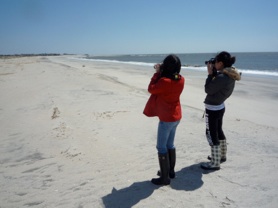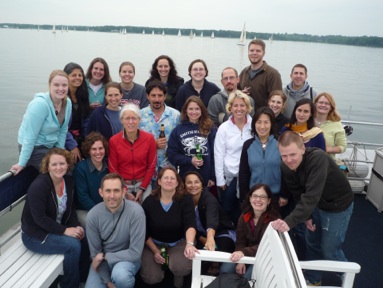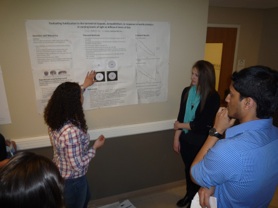Themes in Biology (BIO 185)
Themes is the first biology course that every first-year biology major takes at TCNJ. Originally created by Dr. Don Lovett and Dr. Dennis Shevlin, a major aim of Themes is to engage our new students in new ways of approaching academic studies in general, and the study of life in particular. One of my students called it “AP bio in a blender”. The course is organized into four themes that underlie all of biology: structure and function, bioenergetics, the continuity of life, and evolution. The course has an accompanying lab meeting that engages students in studies of molecular, cellular, and evolutionary processes.
Avian Biology (BIO 344)
This course engages students in the examination of major
concepts and the practice of common methods in
organismal biology, with birds as our focal organisms.
The wide diversity of birds (>9,000 species) makes this
class of vertebrates a rich source for the comparative
analyses that we use throughout the course to elucidate
the functional significance of avian biodiversity. The
ubiquity of some bird species makes it possible to study
free-living birds in the field, so students design, conduct,
and present field research projects multiple times during
the semester. The only pre-requisite is Themes in Biology
(and a willingness to wake up before dawn to do field work).
Animal Behavior (BIO 470)
Paleolithic cave paintings tell us that humans have been interested
in animal behavior for millennia. As a modern scientific discipline,
animal behavior includes scholarship in biology, psychology, and
anthropology. In this course students engage in the study of animal
behavior from a biological perspective, drawing on and integrating
knowledge and skills gained by completion of the first four courses
comprising the core curriculum of the biology degree. Darwin’s
theory of evolution by natural selection, and Tinbergen’s Four
Questions about animal behavior, form the conceptual core of the
course. Students will complete the course with a deep under-
standing of the biological perspective on why animals, including
humans, do what they do, and with experience practicing the
methods used to generate new knowledge about these topics.
Faculty Institutes to Reform Science Teaching (FIRST)
I continue to participate in this National Science Foundation-funded program, which aims to train post-docs in developing inquiry-based, student-centered introductory biology courses. A network of FIRST post-doc alumni (see some of us in the photo, below, with our fearless leader Diane Ebert-May, below, in red) are now implementing our training in our courses across the country as we work to transform undergraduate biology education.


It’s not teaching that causes learning. It’s attempts by the learner to perform that causes learning, dependent upon the quality of the feedback and opportunities to use it.
--Grant Wiggins, American Association for Higher Education Bulletin (1997)

Teaching

Students scanning for Piping Plovers at Cape May, NJ
Students presenting research proposals for a behavioral experiment of their own design and execution.

